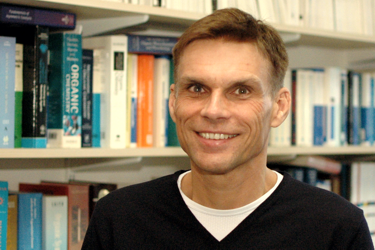

报告题目:Boron an Emergent Element in Radical Chemistry
报告人:Prof.Armido Studer(教授、德国明斯特大学)
报告时间:2019年12月09日 上午10:00-12:00
报告地点:伟德bv1946官网嘉锡楼413
报告摘要:
In the lecture, it will be shown, that readily generated vinyl boron ate complexes, generally used as substrates in the Suzuki-Miyaura coupling, are efficient radical acceptors to conduct electron-catalyzed modular synthesis comprising a radical polar cross over step.1 Along these lines, dienylboron ate complexes react with high efficiency with various C-radicals at the d-position, and the polar cross over rearrangement process delivers valuable allyl boronic esters as products.2 This conceptual approach has recently been successfully also applied to the development of a novel method for the preparation of highly enantioenriched a-chiral ketones.3Hydrogen atom transfer induced boron retaining coupling of organoboronic esters and organolithium reagents is discussed as a straightforward method for the a-C-H functionalization of alkyl boronic esters.
In addition, it will be shown that bis(catecholato)diboron (Cat2B2) is a highly efficient C-radical trapping reagent.5-8 For example, this reactivity was applied to establish a transition-metal-free radical alkene 1,2-carboboration reaction.5 It is further shown that alkyl and aryl iodides react with Cat2B2upon simple irradiation to the corresponding alkyl and aryl boronic esters. Alcohols, if appropriately activated, can also be transformed to boronic esters via radical pathways.7
References:
(1) M. Kischkewitz, K. Okamoto, C. Mück-Lichtenfeld, A. Studer, Science2017, 355, 936.
(2) Kischkewitz, M.; Gerleve, C.; Studer, A. Org. Lett.2018, 20, 3666
(3) Gerleve, C.; Kischkewitz, M; Studer, A. Angew. Chem. Int. Ed.2018, 57, 2441.
(4) D. Wang, C. Mück-Lichtenfeld, A. Studer, J. Am. Chem. Soc.2019, 141, 14126.
(5) Cheng, Y.; Mück-Lichtenfeld, C.; Studer,A. J. Am. Chem. Soc.2018, 140, 6221.
(6) Cheng, Y.; Mück-Lichtenfeld, C.; Studer,A. Angew. Chem. Int. Ed.2018, 57, 16832.
(7) Friese, F. W.; Studer,A. Angew. Chem. Int. Ed.2019, 58, 9561.
(8) Friese, F. W.; Studer, A. Chem. Sci.2019, 10, doi:10.1039/C9SC03765A.

报告人简介:
Studies ETH Zürich (1987-1992); Ph. D. ETH Zürich (1995, Supervisor: Prof. D. Seebach, asymmetric synthesis); Postdoc Pittsburgh Univ. (1995-1996, Supervisor: Prof. D. P. Curran, fluorous chemistry); Habilitation ETH Zürich (1996-2000, radical chemistry); Associate Prof. Marburg Univ. (2000-2004, radical chemistry in synthesis and in materials science); Full Prof. Münster Univ. (2004-present, radical chemistry, surface chemistry, catalysis).
Awards:
Pedler Award RSC, 2019. Elected member of the North Rhine-Westphalian Academy of Sciences, Humanities and the Arts, 2018. Fujian “100 Talent Plan” Professor and Jiaxi Lu Guest Professorship, Chinese Academy of Sciences, Haixi Institutes, Fuzhou, 2018. Highly Cited Researcher 2017 and 2019.
ERC Advanced Grant of the European Research Council, 2016. Research Award of the Westfälische Wilhelms University Münster, 2014. IOCF Yoshida Lectureship, Kyoto University, 2014. Spokesman of the German Research Council funded Collaborative Research Center SFB 858, since 2010. Guest Professorship: Université Bordeaux 1, Bordeaux, 2009. RSC / GE Healthcare Lecture, Cardiff, 2008. Guest Professorship: Pierre et Marie Curie, Paris, 2008. Solvias Ligand Contest Award, 2007. Novartis Young Investigator Award, 2006. Steinhofer Award at the University of Freiburg, 2005.